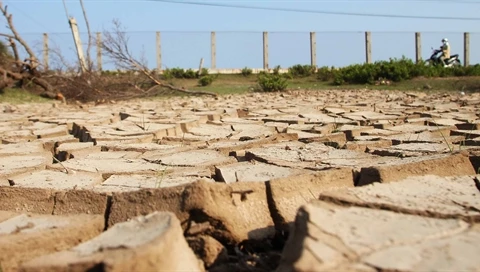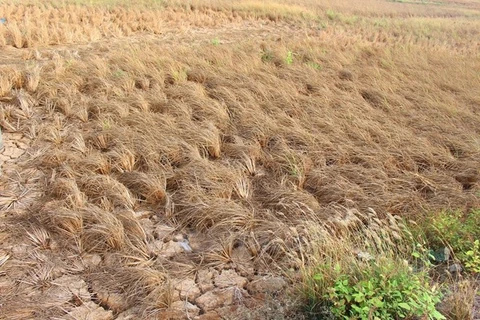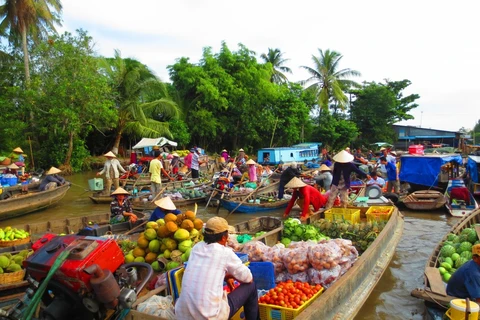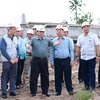 Prime Minister Nguyen Xuan Phuc and World Bank Regional Vice President for East Asia and the Pacific Victoria Kwakwa (Source: VNA)
Prime Minister Nguyen Xuan Phuc and World Bank Regional Vice President for East Asia and the Pacific Victoria Kwakwa (Source: VNA) HCM City (VNA) – Prime Minister Nguyen Xuan Phuc has asked Mekong Delta localities to be aware of the region’s weaknesses, carry out appropriate measures to address difficulties and pursue sustainable agricultural restructuring to ensure locals’ stable livelihoods.
He made the request on June 27 while attending the second Mekong Delta Forum, which was jointly held in Ho Chi Minh City by the World Bank, the Ministries of Agriculture and Rural Development, Natural Resources and Environment, and Planning and Investment, the Embassies of the Netherlands and Australia in Vietnam and several international organisations.
The PM pointed out several shortcomings, including the lack of effective connectivity among regional localities and an appropriate industrial development strategy, and the lack of creativeness in seafood processing although the region accounts for nearly 70 percent of the country’s seafood export turnover.
These shortcomings cause locals’ living standards to be not as good as expected, he added.
According to him, the Mekong Delta region plays a vital role in Vietnam’s development and the region’s food security, as it is considered Vietnam’s largest rice granary, accounting for 90 percent of the nation’s exported rice volume and one fifth of the global rice consumption.
The reduction of the region’s agricultural output not only affects Vietnam but also weakens the world’s food security.
Therefore, the Vietnamese leader asked financial institutions and foreign development partners to work with the Vietnamese Government and Mekong Delta localities to help the region overcome challenges caused by climate change, drought and disasters.
The Government leader also urged the Steering Committee for the Southwestern Region and regional localities to improve regional connectivity, promote the strengths of each locality, develop Can Tho city to a centre linking other Mekong Delta localities.
It is also necessary for the region to integrate in value chains in the country, the region and the world, especially after important free trade agreements such as the Trans-Pacific Partnership (TPP) come into effect, and apply technologies in aquatic and rice farming and fruit planting.
He urged the localities to build a set of new-style rural area criteria for the region in the third quarter of 2016, which are suitable for their characteristics in the context of abnormal drought and saline intrusion, in order to improve the region’s resilience to climate change.
The PM also suggested the WB expand the provision of preferential credits with quicker disbursement time, and send experienced experts to help Vietnam increase its forecast capacity, and improve supervision over climate change and rising sea-levels.
Speaking of the support from major financial institutions, particularly the WB, and foreign Governments, the leader affirmed that Vietnam will coordinate well with them to handle issues facing the Mekong Delta.
World Bank Regional Vice President for East Asia and the Pacific Victoria Kwakwa agreed that challenges facing the region, including drought and saline intrusion, need the involvement of numerous partners and international organisations along with Vietnamese ministries and localities.
Therefore, the forum was a good chance for international development partners and Vietnamese offices to seek measures to help the region gain sustainable growth.
During the two-day forum, participants are expected to discuss measures to respond to climate change and this phenomenon’s risks, as well as sustainable models that are resilient to climate change, and the role of related parties like private businesses, research centres, civil organisations, and non-governmental organisations to increase the efficiency of these models.
The Mekong Delta region comprises of 12 provinces and one centrally-run city with a total area of 40,000 square kilometres and a combined population of 18 million.-VNA






















